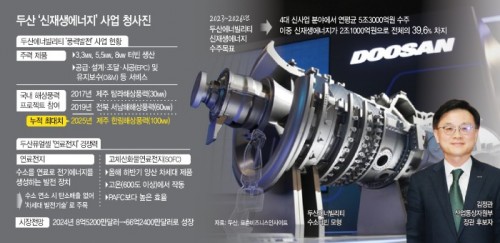 |
With Doosan Enerbility CEO Kim Jung-kwan nominated as the next Minister of Trade, Industry and Energy, Doosan Group’s clean energy ventures are poised to play a central role in the new administration’s energy policy. The group has been diversifying across nuclear power, offshore wind, and hydrogen energy, gaining momentum both at home and abroad.
Doosan has taken a leading position in next-generation technologies such as hydrogen turbines, hydrogen co-firing, and fuel cells, combining R&D and demonstration efforts. Given the Lee Jae-myung administration’s strong commitment to climate action and energy transition, the appointment of a sitting Doosan executive is widely seen as a sign that green-centered policy will gain further traction, potentially benefiting Doosan directly.
The nomination of Kim Jung-kwan on June 29 sparked immediate interest across the energy sector. A former high-level official at the Ministry of Economy and Finance (36th civil service exam), Kim joined Doosan Group in 2018, where he rose to become CEO of Doosan Enerbility.
Industry observers view Kim as a rare figure who bridges the public and private sectors with deep energy expertise. His elevation suggests Doosan’s renewable energy portfolio could closely align with the administration’s agenda.
Doosan Group has recently expanded investments into clean energy, undergoing a strategic restructuring. While the Democratic Party has traditionally been skeptical of nuclear power, President Lee's pragmatism is expected to steer away from hardline anti-nuclear policies.
Attention is now turning to Doosan Enerbility and Doosan Fuel Cell, the group's key energy arms. Doosan Enerbility remains the sole domestic manufacturer of nuclear main components. For the Czech nuclear power project, it is supplying core systems including reactors, steam generators, and coolant pumps, and is set to take part in construction. The company is also advancing in the small modular reactor (SMR) sector through global partnerships.
As Korea’s only manufacturer of large gas turbines, Doosan Enerbility plans to leverage this strength to develop hydrogen turbines by 2027. In offshore wind, where the firm holds the highest domestic track record, expansion is also underway.
Doosan Fuel Cell is similarly scaling up hydrogen-based operations. On June 29, the company announced a joint development project with Korea Western Power to create a hydrogen fuel cell model powered by biogas. This eco-friendly system utilizes biogas derived from sewage and organic waste. Since biogas is rich in methane, it can be processed to extract hydrogen. The fuel cells can run on pure biogas or a blend with natural gas.
Fuel cells generate electricity by converting hydrogen into energy without emitting carbon, making them ideal for clean mobility and power generation. According to Fortune Business Insights, the global hydrogen power market is projected to grow from $852 million last year to $6.62 billion.
Doosan Fuel Cell plans to invest 99.5 billion won ($72 million) over three years in R&D, production capacity expansion, and technological upgrades—about 70 billion won of which is expected this year alone.
An energy industry official said, “As a former bureaucrat, Kim understands policy intricacies and now brings on-the-ground business insight. Doosan, which once struggled under the previous administration’s nuclear phase-out, has rebounded by pivoting toward nuclear, hydrogen, and wind. With the new government emphasizing both carbon neutrality and energy security, Doosan could reemerge as a core policy partner.”
Most Read
-
1
-
2
-
3
-
4
-
5
-
6
-
7





















